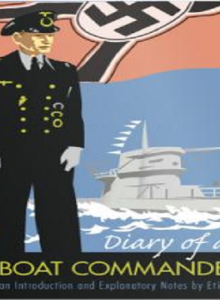The Diary of a U-boat Commander

Book Review: The Diary of a U-Boat Commander ( WWI Submarine Warfare Memoir )
“The Diary of a U-Boat Commander” takes the readers to the war and the life of a German submarine commander during World War I which is a fictional account of a diary that provides a personal view of a war and a military man working in the low profile and high peril of submarine warfare of the time.
The story is narrated in the journal format to provide the reader with the direct and actualist input of the commander. At the beginning U-boat commander is an optimistic and aggressive youth, full of responsibilities and honorable rank in the Kriegsmarine. While reading through diary entries, one seems to know his subject as a dedicated soldier and a patriot but as the diary unfolds the reader sees a man in the internal war with himself and the difficulty in making… I found that the main character is brave but it is shown that he always fights with his personal feelings due to his responsibilities, so the character is complex.
It will be recalled that the depiction of life inside the U-boat is one of the most emphatic aspects of the story. Technical details are mentioned and such as how the compact space of the boat creates a feeling of suffocation; how the tension does not ease even when Aceh waters are sailed through. The author gives a good description of the threatening environment and uncertainty of their situation since submarines in this period were not very reliable. It is involved in war, and as a ship has mechanical failures, the sea also poses a threat to the entire crew.
The diary also reveals much about details such as the relationship of the commander and his social isolation and loneliness. His personality is developed by the way how he communicates with his colleagues and his desire for a love affair. Of course, all such tender scenes are important for the readers to be aware that although characters might seem invulnerable and absolutely committed to their training, they have their human sides too.
Another theme present in the book is between right and wrong. Ershon’s moral dilemmas and struggles throughout the novel when his mission is to attack civilian ships. This internal conflict is what makes the story more than just about war as there other what is going on inside the main character’s mind. In its entirety, it explores the psychological impact of war and has been known to pose some questions moral to war.
However, the language adopted and the mode of the book is simple and the book is in the form of a diary. It enables the readers to be in the ‘shoes’ of the commander at any one time to share his joys or pains. This intimacy makes the story more interesting and, yes, emotionally arresting.
But still, the book is not without content problems. For some of the readers, it may be that the rhythm of the narration is not quite correct; the tones of the diary occasionally change from active to passive. Moreover, the meager positive attributes of the commander are that at times his or her attitude can be deemed arrogant or simply unlikeable. But these qualities contribute to efforts that make him a more realistic and rounded character.
Lastly, “The Diary of a U-Boat Commander” is a very engaging novel of historical detail and strong feelings. It provides the viewer with historically accurate insight into the face of War World I and the problems that soldiers encountered in one of the most deadly theaters of the war. This book is highly recommended for any lover of war literature, psychological drama, or a simple story of transformation in the middle of the storm.


